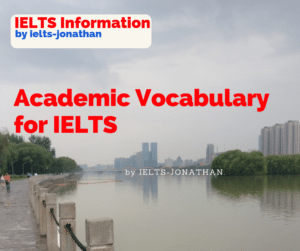IELTS Vocabulary to learn – Week 4
While I have been working from Taiyuan, Shanxi Province in China I got the opportunity to travel by bullet train to Beijing to visit colleagues from the past.
It was interesting catch up with and to talk to them about their IELTS experiences in China. Back to teaching.
So this week on the course, the short test was about the most common vocabulary from the texts and listening we have been using, and of course, I’d like to share these with you.
These are very common academic words, and can occur in any exam text or listening.
High Frequency IELTS Words
As they are high frequency words, then they can occur in the IELTS test too.
You should also be able to use these words in speaking and writing, so pay attention to their meaning and check the pronunciation.
I’ve provided a mini quiz for you to consider at the end too.
Vocabulary to learn – week 4
This week, you need to study the words but give examples of their use yourself. These examples, should not come from the texts/listenings/example essay, but they should be your own examples. Submit your example sentences to your teacher on the first day of week 5. There will also be a test.
|
Word |
Definition/synonym |
|
dominate (v) |
To be the largest, most important, or most noticeable part of something. |
|
generate (v) |
1. To cause something to exist. 2. (in this exam) To produce energy. Make two example sentences and make sure you know both meanings. |
|
convert (v) |
To change the appearance, form, or purpose of something. |
|
create (v) |
To make something happen or exist. |
|
source (n) |
1. A thing, place or activity that you get something from. 2. (Very important academic meaning) A person, book or document that supplies you with information. Make two example sentences and make sure you know both meanings. |
|
utilise (v) |
To use something in an effective way. |
|
reliance (n) |
The fact of depending on someone or something. |
|
rely (v) |
To need someone or something in order to be successful, work correctly, etc. |
|
item (n) |
A single thing in a set or on a list. |
|
exploit (v) |
1. To use or develop something for your advantage. (In this text, and this meaning is common in academic English) 2. To not pay or reward someone enough for something (common more general meaning) Make two example sentences and make sure you know both meanings. |
|
pursue (v) |
If you pursue a plan, activity, or situation, you try to do it or achieve it, usually over a long period of time. |
|
percentage (n) |
An amount of something, expressed as a number out of 100. |
|
alternative (n)
|
One of two or more things that you can choose between. |
|
domestic (adj) |
1. Inside one country and not international (in this text, academic). 2. Inside the home (general) Make two example sentences and make sure you know both meanings. |
|
release (v) |
1. To let a substance flow out from somewhere. 2. To allow a prisoner to be free (more common general meaning) |
|
occur (v) |
To happen, often without being planned. |
|
policy (n) |
A set of ideas or a plan of what to do in particular situations that has been agreed by a government, business, etc. |
|
evidence (v) |
To show that something exists or is true. |
|
community (n) |
1. The people living in a particular area. 2. A group of people with the same interests, nationality, job, etc. Make two example sentences and make sure you know both meanings. |
|
impact (v, n) |
Verb: To have an influence on something. Noun: A powerful effect that something, especially something new, has on a situation or person. Learn and make example sentences for both forms. |
IELTS Vocabulary Test
If you are confident you know these words, you can try and complete this mini test. You can do this in your head, or on paper.
Vocabulary quiz week 4 (For first day of week 5)
Part 1: Dictation
Write down the words you hear and their part of speech (noun/adjective/verb/adverb etc.)
1.
2.
3.
4.
5.
Part 2: Comprehension
- Use the correct words in the box below in the following sentences. The words in the box are given in their base forms, you may need to add tense, a 3rd person singular s on verbs, or a plural marker on nouns.
dominate, create, utilise, pursue, alternative, exploit, policy, community, impact, release
- Coal power stations sulphur dioxide into the atmosphere.
- In the absence of any better , we will have to proceed with the original plan.
- Her ideas have attracted a lot of attention in the scientific .
- The investment strategy is by experienced multinationals.
- This decision will have a disastrous on foreign policy.
- Exporters can currently the favourable exchange rates.
- The merger of these two companies would the world’s biggest accounting firm.
- We need to decide soon what marketing strategy we should for these new products.
- What is your party’s on immigration?
- The dispute is likely to the news.
Total: /
and here are the answers
I’m Jonathan
I’ve taught IELTS and University English in more than a dozen universities and schools around the world.
I’m a parent, traveller and passionate about language teaching and helping students achieve their dreams.
Whilst living in Austria or working in Asia, I run IELTS courses to help students get to where they want to be.
If you are serious about IELTS, connect with me to see how I can help you.



